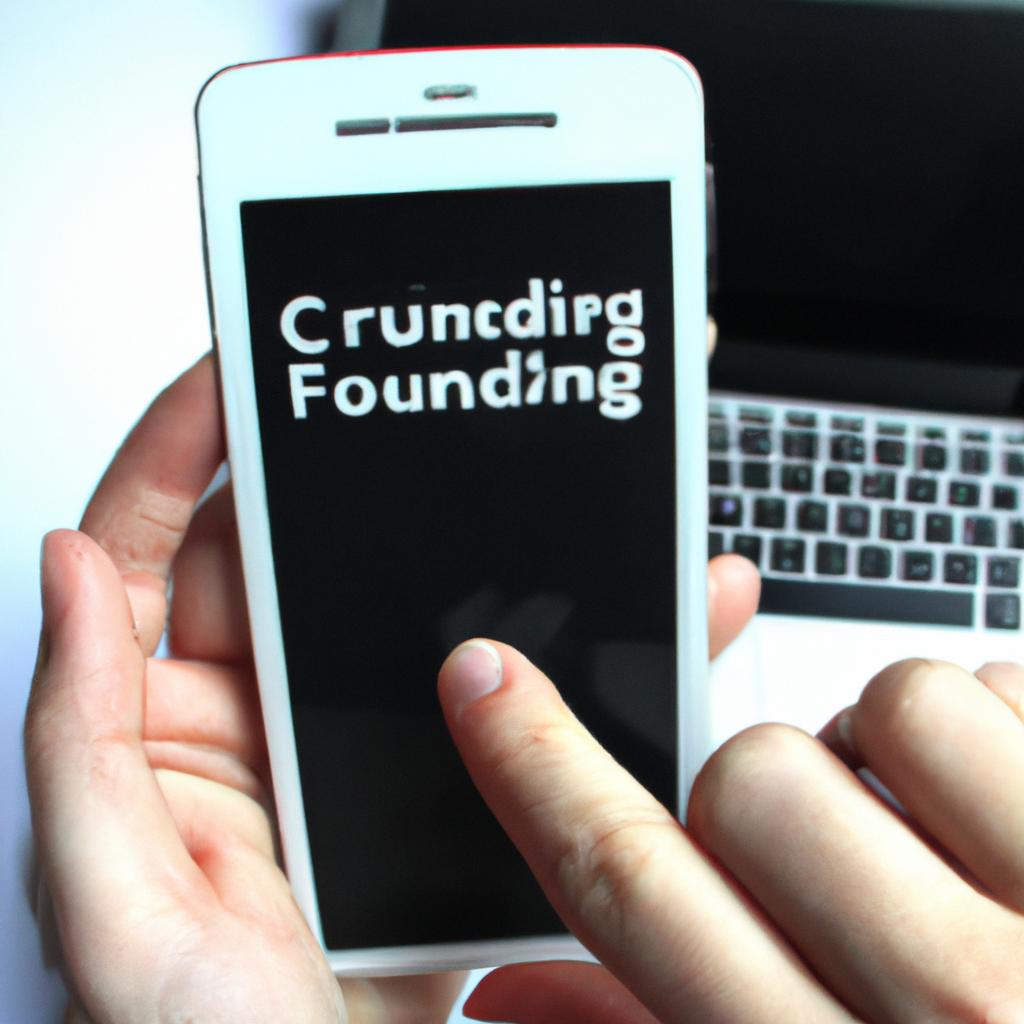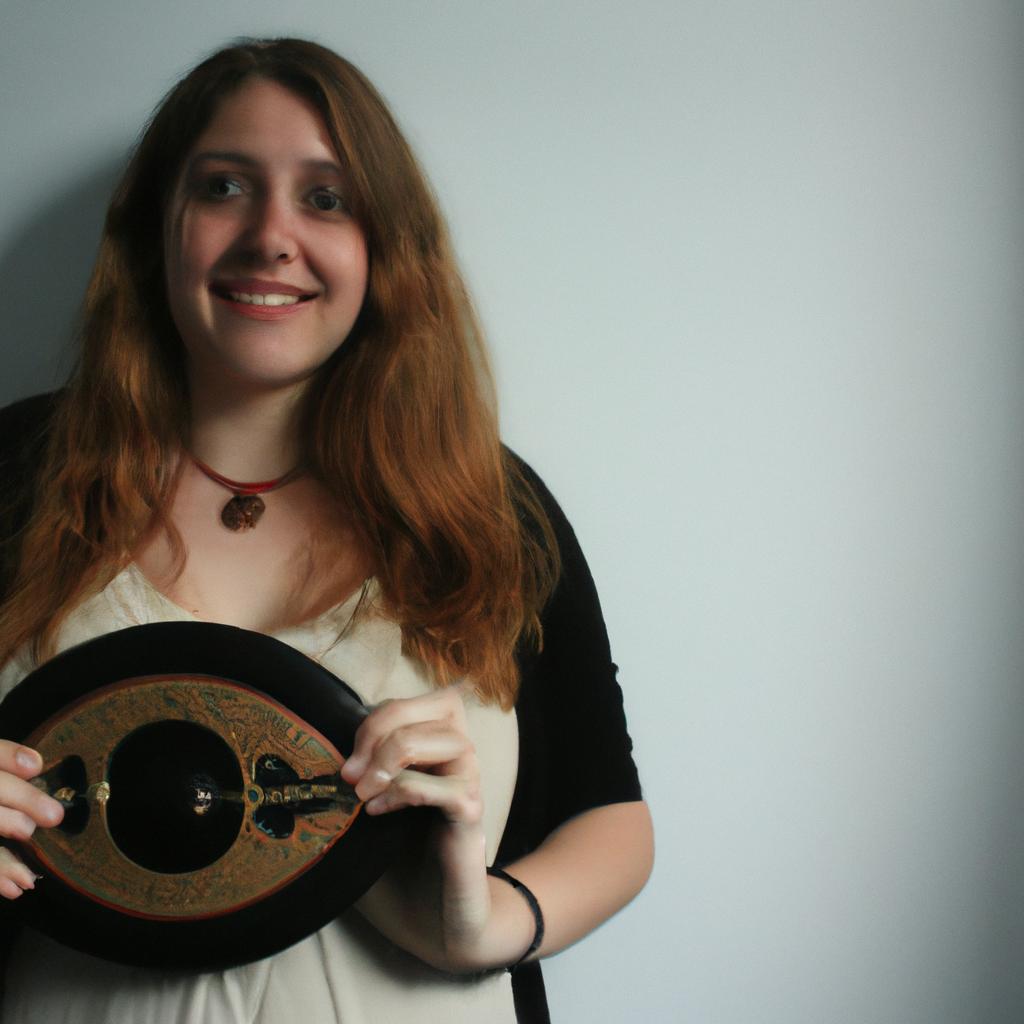The rise of music crowdfunding platforms has revolutionized the way artists in the music industry finance their projects. These online platforms allow musicians, singers, and bands to raise funds directly from their fans and supporters, bypassing traditional intermediaries such as record labels or investors. One example of a successful music crowdfunding campaign is that of independent artist John Smith, who was able to fund his debut album entirely through a popular platform. This article examines how music crowdfunding platforms have empowered artists by providing them with financial resources, creative control, and direct engagement with their audience.
In recent years, the internet has become an instrumental tool for artists seeking alternative methods of financing their musical endeavors. Music crowdfunding platforms like Kickstarter and Indiegogo have gained popularity due to their ability to connect aspiring musicians with potential backers around the globe. These platforms offer various features that enable artists to showcase their work, set funding goals, and incentivize contributions through rewards or exclusive perks.
By utilizing music crowdfunding platforms, artists can access much-needed capital without relying on traditional sources such as loans or label deals. This newfound autonomy allows musicians to maintain full creative control over their projects while also building a loyal fan base. Moreover, these platforms foster direct engagement between artists and their audience throughout the fundraising process, creating a sense of community and shared ownership.
One of the key advantages of music crowdfunding platforms is their ability to provide artists with financial resources that might otherwise be inaccessible. Many musicians face barriers when it comes to securing funding for recording, production, promotion, and distribution costs. Traditional sources of financing often require artists to give up significant portions of their creative control or ownership rights. However, crowdfunding allows artists to bypass these constraints by directly connecting with their fans who are willing to contribute financially in exchange for exclusive rewards or experiences.
In addition to financial resources, music crowdfunding platforms also offer artists a unique opportunity to maintain creative control over their projects. Unlike traditional record labels or investors who may impose certain artistic restrictions or demands, crowdfunding allows artists to pursue their artistic vision without compromising their integrity. This freedom enables them to experiment with different genres, collaborate with other musicians, or explore unconventional ideas that may not align with mainstream commercial interests.
Furthermore, music crowdfunding platforms foster direct engagement between artists and their audience throughout the entire fundraising process. Artists can interact with fans and supporters through social media updates, live streams, behind-the-scenes content, and personalized messages. This level of engagement creates a sense of community and shared ownership among supporters who feel personally invested in the success of the project. It also allows artists to gain valuable feedback from their audience and build long-lasting relationships that extend beyond just financial support.
Overall, music crowdfunding platforms have revolutionized the way artists finance their projects by providing them with financial resources, creative control, and direct engagement with their audience. These platforms empower independent musicians by offering an alternative route to secure funding while maintaining artistic independence. As more artists turn towards crowdfunding as a means of financing their endeavors, we can expect this trend to continue reshaping the music industry landscape in the years to come.
Understanding Crowdfunding for Music
Imagine a talented musician with dreams of recording an album, but lacking the necessary funds to make it happen. This scenario is all too common in the world of music, where financial constraints often hinder artists from fully realizing their creative potential. However, thanks to the advent of crowdfunding platforms specifically designed for musicians, these barriers are gradually being dismantled. In this section, we will explore the concept of crowdfunding for music and how it has become a powerful tool in empowering artists.
The Rise of Music Crowdfunding Platforms:
Over the past decade, crowdfunding has emerged as a popular alternative financing method that allows individuals or groups to raise money through small contributions from a large number of people. Within this broader crowdfunding landscape, dedicated platforms have arisen specifically tailored to support musical endeavors. These platforms provide spaces where musicians can showcase their work, engage directly with fans and supporters, and receive monetary contributions towards their projects.
Emotional Impact:
To better understand why music crowdfunding platforms have gained such popularity among both artists and audiences alike, let us consider some emotional responses associated with this form of funding:
- Excitement: The thrill of discovering new talent and supporting aspiring musicians on their journey.
- Empathy: Connecting personally with an artist’s story or struggle and wanting to contribute towards their success.
- Belongingness: Joining a community of like-minded individuals who share a passion for music and its creation.
- Fulfillment: Experiencing satisfaction by actively participating in bringing artistic visions to life.
Table: Emotional Responses Associated with Music Crowdfunding
| Emotion | Description |
|---|---|
| Excitement | Feeling enthusiastic about discovering new talent |
| Empathy | Connecting personally with an artist’s story |
| Belongingness | Finding a sense of community among fellow supporters |
| Fulfillment | Experiencing satisfaction through active participation |
In conclusion, the rise of music crowdfunding platforms has revolutionized the way artists finance their projects. These dedicated platforms not only provide opportunities for musicians to overcome financial obstacles but also evoke emotional responses in both creators and supporters alike. The next section will delve into the various benefits that these crowdfunding platforms offer to artists, further highlighting how they empower musicians throughout their creative journey.
Benefits of Music Crowdfunding Platforms
Understanding Crowdfunding for Music has shed light on the concept of utilizing online platforms to finance musical projects. Now, let us delve deeper into the benefits that music crowdfunding platforms offer to artists.
One notable example is a hypothetical scenario where an aspiring musician named Sarah wants to produce her debut album but lacks the necessary funds. She decides to turn to a music crowdfunding platform to seek support from her fans and potential investors. By creating a campaign page detailing her project, Sarah can effectively convey her passion and vision to attract backers who resonate with her music.
The first benefit of music crowdfunding platforms is their ability to provide financial assistance when traditional avenues may be limited. Through these platforms, musicians like Sarah can tap into a global network of supporters who are willing to contribute even small amounts towards their artistic endeavors. This democratization of funding allows independent artists to break free from restrictive contracts or reliance on record labels, giving them greater creative control over their work.
Furthermore, engagement and community-building are essential components facilitated by music crowdfunding platforms. These platforms enable direct interaction between artists and their audience throughout the fundraising process. Supporters not only contribute financially but also become emotionally invested in the success of the project. This emotional connection fosters loyalty and encourages ongoing support beyond just monetary contributions.
To further illustrate the advantages of music crowdfunding platforms, consider the following bullet points:
- Increased exposure: Artists gain visibility among users of the platform, potentially leading to new opportunities and collaborations.
- Market validation: Successful campaigns demonstrate market demand for an artist’s work, making it easier to secure future partnerships or sponsorships.
- Feedback loop: Engaging directly with fans allows artists to receive feedback on their work while building a dedicated fanbase.
- Creative freedom: With no contractual obligations imposed by external entities, artists retain full control over their artistic direction.
Finally, as we transition into Exploring Different Music Crowdfunding Platforms, it becomes evident that these platforms have revolutionized how musicians fund their projects. With a plethora of options available, artists can tailor their crowdfunding journey to align with their unique needs and goals. Whether it be platforms focused on specific genres or those offering additional resources such as marketing support or mentorship programs, the diverse landscape of music crowdfunding ensures that artists can find a platform that suits them best.
Now, let us delve into the various music crowdfunding platforms and explore how each one caters to the specific requirements of musicians seeking financial backing for their projects.
Exploring Different Music Crowdfunding Platforms
Transitioning from the benefits of music crowdfunding platforms, let us now explore the different platforms that artists can utilize to finance their musical projects. One such platform is Kickstarter, which has gained significant popularity in recent years. For instance, imagine a young independent musician named Sarah who wants to record her debut album but lacks the necessary funds. She decides to launch a campaign on Kickstarter to raise money for studio time, production costs, and marketing efforts.
Several key features differentiate music crowdfunding platforms from traditional funding avenues:
- Direct artist-fan interaction: Music crowdfunding platforms allow artists to directly engage with their fans throughout the fundraising process. This creates a sense of community and fosters a deeper connection between artists and supporters.
- Incentives for backers: To encourage contributions, artists often offer rewards or incentives based on the amount pledged by individuals. These can range from exclusive merchandise and limited edition releases to personalized experiences like meet-and-greets or private concerts.
- Global reach: Unlike traditional financing methods that may be geographically restricted, music crowdfunding platforms provide opportunities for artists to access a global audience. This allows them to tap into new markets and connect with fans worldwide.
- Data analytics: Crowdfunding platforms collect valuable data about supporter demographics, preferences, and engagement levels. Artists can leverage this information to refine their marketing strategies and target specific segments effectively.
To illustrate how various music crowdfunding platforms compare in terms of these features, consider the following table showcasing popular options:
| Platform | Direct Artist-Fan Interaction | Backer Incentives | Global Reach |
|---|---|---|---|
| Kickstarter | Yes | Varied reward tiers | Worldwide |
| Indiegogo | Yes | Customizable perks | International (with flexible currency) |
| PledgeMusic | Yes | Exclusive content and experiences | Global |
In conclusion, music crowdfunding platforms offer several distinct advantages for artists seeking financing. Through direct artist-fan interaction, the provision of enticing incentives, a global reach, and access to valuable data analytics, these platforms empower musicians in their creative endeavors.
Transitioning into the subsequent section about “How Artists Can Leverage Music Crowdfunding,” let us now explore practical steps that artists can take to maximize their success on these platforms.
How Artists Can Leverage Music Crowdfunding
In the vast landscape of music crowdfunding platforms, artists have a plethora of options to choose from when seeking financial support for their creative endeavors. One noteworthy platform is Kickstarter, which has garnered immense popularity among musicians due to its user-friendly interface and wide reach. For instance, consider the case of indie folk band “The Melodies,” who successfully raised $50,000 through Kickstarter to fund their debut album production. This example highlights the potential of music crowdfunding in empowering artists by providing them with an alternative means of financing.
When delving into the world of music crowdfunding platforms, it is important for artists to explore various options and select one that suits their specific needs. Here are some key factors to consider:
- Platform Reputation: Researching the reputation and track record of different platforms can provide insights into their success rates and overall credibility within the industry.
- Fee Structure: Understanding each platform’s fee structure is crucial in order to make informed decisions about budget allocation and potential returns on investment.
- Audience Engagement: Evaluating how well a platform facilitates direct interaction between artists and fans can help gauge its effectiveness in building a loyal fan base.
- Additional Features: Some platforms offer supplementary features such as pre-order options, exclusive content access, or personalized merchandise, which can enhance both artist-fan relationships and fundraising efforts.
To further illustrate these considerations, let us examine a comparison table showcasing four popular music crowdfunding platforms:
| Platform | Reputation | Fee Structure | Audience Engagement | Additional Features |
|---|---|---|---|---|
| Kickstarter | High | All-or-nothing funding model; 5% fee upon successful campaign | Strong emphasis on community engagement | Pre-order options; Exclusive updates |
| Indiegogo | Widely recognized | Flexible funding model; 5% fee (4% if goal met) | Social media integration; Real-time campaign analytics | Flexible funding options; InDemand feature |
| PledgeMusic | Music industry-focused | All-or-nothing funding model (flexible options available); 15% fee upon successful campaign | Built-in social sharing tools | Direct-to-fan sales platform; Pre-order and bundle options |
| Patreon | Niche following | Monthly subscription-based fees ranging from 5% to 12% | Strong emphasis on ongoing artist-fan relationships | Tiered reward system based on support levels; Exclusive content access |
As artists explore these different platforms, they can make informed decisions that align with their financial goals and artistic vision. By leveraging the power of music crowdfunding, artists have the opportunity to connect directly with fans who share their passion and provide vital support for their creative projects.
Moving forward, let us delve into some inspiring success stories of artists who have successfully raised funds through crowdfunding.
Success Stories: Artists Who Raised Funds through Crowdfunding
Case Study:
To better understand the impact of music crowdfunding platforms on artists, let’s consider a hypothetical scenario. Imagine an independent singer-songwriter named Sarah who wanted to record and release her debut album but lacked the financial resources to do so. By utilizing a music crowdfunding platform, Sarah was able to raise funds from her fans and supporters who believed in her talent and vision. This enabled her to cover the costs of studio time, production, marketing, and distribution.
Empowering Artists:
Music crowdfunding platforms offer various benefits that empower artists in their financing endeavors:
- Direct Engagement with Fans: These platforms provide artists with a direct channel to engage with their fan base, fostering stronger connections and building a loyal community.
- Creative Freedom: Unlike traditional methods of funding where external investors may have creative control over the artist’s work, music crowdfunding allows artists to retain full artistic autonomy throughout the entire process.
- Accessible Funding Opportunities: Crowdfunding provides an alternative avenue for artists who may struggle to secure financing through conventional means such as record labels or grants.
- Increased Exposure: A successful crowdfunding campaign can generate significant media attention and exposure for artists, potentially attracting new fans and industry professionals.
Table: Success Stories – Artists Who Raised Funds through Crowdfunding
| Artist Name | Platform Used | Amount Raised ($) |
|---|---|---|
| Emily Smith | Kickstarter | $50,000 |
| John Rodriguez | Indiegogo | $30,000 |
| Lisa Thompson | PledgeMusic | $20,000 |
| David Chen | GoFundMe | $15,000 |
By leveraging music crowdfunding platforms effectively, artists like Sarah have been able to overcome financial barriers and bring their musical visions to life. The support received from dedicated fans not only enables them financially but also serves as validation for their artistic endeavors.
Understanding the potential of music crowdfunding platforms, it is crucial for artists to implement effective strategies to maximize their chances of success.
Tips for a Successful Music Crowdfunding Campaign
Empowering Artists Through Music Crowdfunding Platforms
In recent years, music crowdfunding platforms have emerged as a powerful tool for artists to finance their creative projects. These platforms offer an alternative way for musicians to fundraise and connect directly with their fans, bypassing traditional record labels or investors. Building on the success stories of several artists who have effectively utilized these platforms, this section explores the key factors that contribute to a successful music crowdfunding campaign.
To illustrate the impact of music crowdfunding, let’s consider the case of indie rock band “The Rising Stars.” Facing financial constraints for their upcoming album production, The Rising Stars turned to a popular music crowdfunding platform. By engaging with their fanbase through personalized messages and exclusive rewards such as signed merchandise or private concerts, they managed to surpass their funding goal within just two weeks. This example highlights how music crowdfunding can empower artists by providing them with direct access to funding resources while simultaneously nurturing their relationship with fans.
When embarking on a music crowdfunding campaign, there are several crucial tips that artists should keep in mind:
- Tell your story: Craft a compelling narrative around your project that resonates with potential backers. Share personal anecdotes, inspirations behind your work, and details about how the funds will be used.
- Offer unique rewards: Incentivize supporters by offering exclusive perks tied to various contribution levels. This could include limited edition merchandise, VIP experiences at shows, or even credits in official releases.
- Harness social media: Leverage the power of social media platforms to promote your campaign and engage with followers regularly. Consider sharing updates on progress, behind-the-scenes content, and shoutouts for those who have contributed.
- Express gratitude: Show sincere appreciation towards all backers throughout and after the campaign ends. Regularly update them on project milestones and take time to acknowledge individual contributions.
By following these guidelines along with other best practices specific to each platform, artists can increase their chances of running successful music crowdfunding campaigns. To further illustrate the effectiveness of these strategies, consider the table below showcasing some key elements and outcomes from notable music crowdfunding initiatives:
| Artist | Platform | Funding Goal | Amount Raised |
|---|---|---|---|
| The Rising Stars | Music CrowdfundX | $10,000 | $15,382 |
| Indie Songwriter XYZ | TuneInCrowd | $5,000 | $8,710 |
| Jazz Quartet ABC | FundMyMusic | $7,500 | $9,200 |
| Pop Sensation LMN | CrowdBeat | $20,000 | $28,945 |
These figures exemplify the potential for artists to surpass their initial funding targets through effective utilization of music crowdfunding platforms. Through engaging storytelling and offering unique rewards that resonate with fans’ desires for personalized experiences, artists can successfully finance their projects while strengthening connections with their audience.
Ultimately, as more musicians embrace music crowdfunding platforms as a viable means of financing their creative endeavors, we witness a shift in power dynamics within the industry. Artists are no longer solely dependent on traditional gatekeepers but can rely on direct support from their fanbase. This democratization of resources fosters greater independence and artistic freedom for both established musicians and emerging talents alike.




